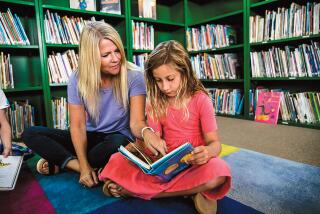Year of the Reader
- Share via
Congress has officially designated 1987 as the Year of the Reader, with a new law that aims at “restoring . . . reading to a place of preeminence in our personal lives and in the life of our nation.” Note that all-important word restoring . What it recognizes is that reading skills and habits have been steadily declining and now are badly in need of promotion, among young and old alike.
In 1984 the privately funded Center for the Book at the Library of Congress reported the results of a survey that it had commissioned on national reading habits. The survey found a sharp drop in book reading among younger Americans. In 1978, 75% of Americans 21 or younger read books. Six years later that had fallen to 63%. Book reading among those 65 and older has also dropped markedly. The usual excuse is that there is too much competition for leisure time. But surely the quality and value of leisure activities that compete with reading ought to be carefully weighed. Reading nourishes the mind just as food nourishes the body. A nation concerned with its physical health can’t afford to be any less attentive to the mental malnutrition that now afflicts so many Americans.
There are some who blame the schools for the decline of interest in reading among the young. In fact, the problem begins in the home. The time to awaken kids to the world of books is when they’re still at an age at which they have to be held in the lap and read to. In many homes, though, reading is a virtually unknown activity. Studies done some years ago came up with the appalling revelation that the average child, by the time he enters first grade, will already have spent more hours watching television than he will spend over the next 12 years in a classroom. Schools can teach reading. It is up to parents to insist that the skill be used.
Private organizations around the country are involved in the Year of the Reader, focusing in part on what social scientists now call aliteracy--referring to the loss of reading skills and interest by those who can read but don’t. The significance of reading, though, doesn’t begin and end with the personal pleasure that it gives. Congress has noted the importance of again giving reading a preeminence in national life. That’s not just rhetoric. The new buzzword in Washington these days is competitiveness , meaning an effort to regain lost ground in the international economic arena. Economic success and literacy go hand in hand. The Japanese and the South Koreans, among others, know that. Americans have started to forget, and the results show.
More to Read
Sign up for our Book Club newsletter
Get the latest news, events and more from the Los Angeles Times Book Club, and help us get L.A. reading and talking.
You may occasionally receive promotional content from the Los Angeles Times.







